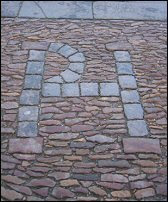A commemoration we forgot: +St. Patrick Hamilton+

The other day one of the local TV stations did a story about a lady in a Grinnell nursing home who was having her 25th birthday- even though she was born one hundred years ago.
It was "Leap Day," aka Sadie Hawkins' Day, aka February 29. It only comes once every four years. And since it will be four years before I get another opportunity, I thought I'd add a commemoration we shouldn't let get by. If I had ever hosted the Lutheran Carnival, it would have been the one I would have used as a theme. As it is, the Carnival has been suspended- for the most part because Lutheran bloggers like myself were derelict in sending in entries.
I hope it comes back soon, and we get a chance for amendment. But I digress. February 29 was the birthday into eternal life of a relatively unknown reformer who- since I am a Lutheran of Scotch-Irish descent- is of special significance to me.
Sometime in the year 1504- we don't know the exact date- a grandson was born to King James II of Scotland. Patrick Hamilton was a second son, and as such was destined for the Church. A titular abbot at a very young age, young Patrick used the income from the benefice of Fearn Abbey to travel to the Continent and study at the University of Paris. There, he first encountered the writings of Martin Luther, which he became convinced represented the authentic teachings of Holy Scripture.
After leaving Paris to study at the University of Leuven- famous chiefly for the presence on its faculty of Erasmus of Rotterdam- Patrick returned to Scotland, was married to a lady of noble birth, and, in 1524, was admitted to the faculty of St. Andrew's University. The young man apparently had musical talent; one of the high points of his career at St. Andrew's was his conducting of a mass of his own composition at the cathedral, St. Salvator's. But his chief passion was the proclamation of the Gospel of justification by grace, for Christ's sake, through faith.
His adherence to Luther's doctrines began to attract the attention of James Cardinal Beaton, the Archbishop of St. Andrew's, and despite his noble background Hamilton came under intense pressure to be silent. The pressure finally became so severe that he fled the country. Returning to the Continent, he actually met Martin Luther, and continued his studies at the University of Marburg.
In 1527, however, Hamilton- convinced that it was his duty to return to Scotland and proclaim the Gospel despite his conviction that he was going to his death- returned to St. Andrew's. For a brief time he was allowed comparative freedom to preach, probably so that Cardinal Beaton's henchmen could gather evidence. But when he was finally seized, and placed on trial on charges of heresy. the main evidence against him was adduced from the only book he ever wrote, Loci communes- popularly known in Scotland as "Patrick's Places." Essentially, it was a brief, lucid setting forth of the distinction between Law and Gospel.
Convicted after a sham "debate" with a certain Friar Campbell, Hamilton was immediately taken to the courtyard outside St. Salvator's and burned at the stake. His popular support was so great that his persecutors feared a violent attempt to rescue him if the execution was delayed. He was only 24 years of age.
The burning was botched. Too little wood was supplied, and the fire went out while Hamilton was still alive. All in all, he burned for six hours, between noon and six p.m. Horrific and prolonged as his agony was, he bore it with such courage that it became a legend- a legend which played a major role in the eventual triumph of the Scottish Reformation. It was said by mournful Scottish Catholics that "the reek (smoke) of Patrick Hamilton infected all it blew on."
A monogram of Hamilton's, pictured above, is set in the flagstones at the place in the cathedral square where he was burned. An undergraduate superstition holds that to accidentally step on it is to be doomed to fail all of one's courses- unless one removes the "curse" by jumping into the North Sea first!
Hamiliton is little remembered, and it certainly doesn't help that his feast day is February 29. But God remembers- and blessed to the Lord are the deaths of his saints.


Comments